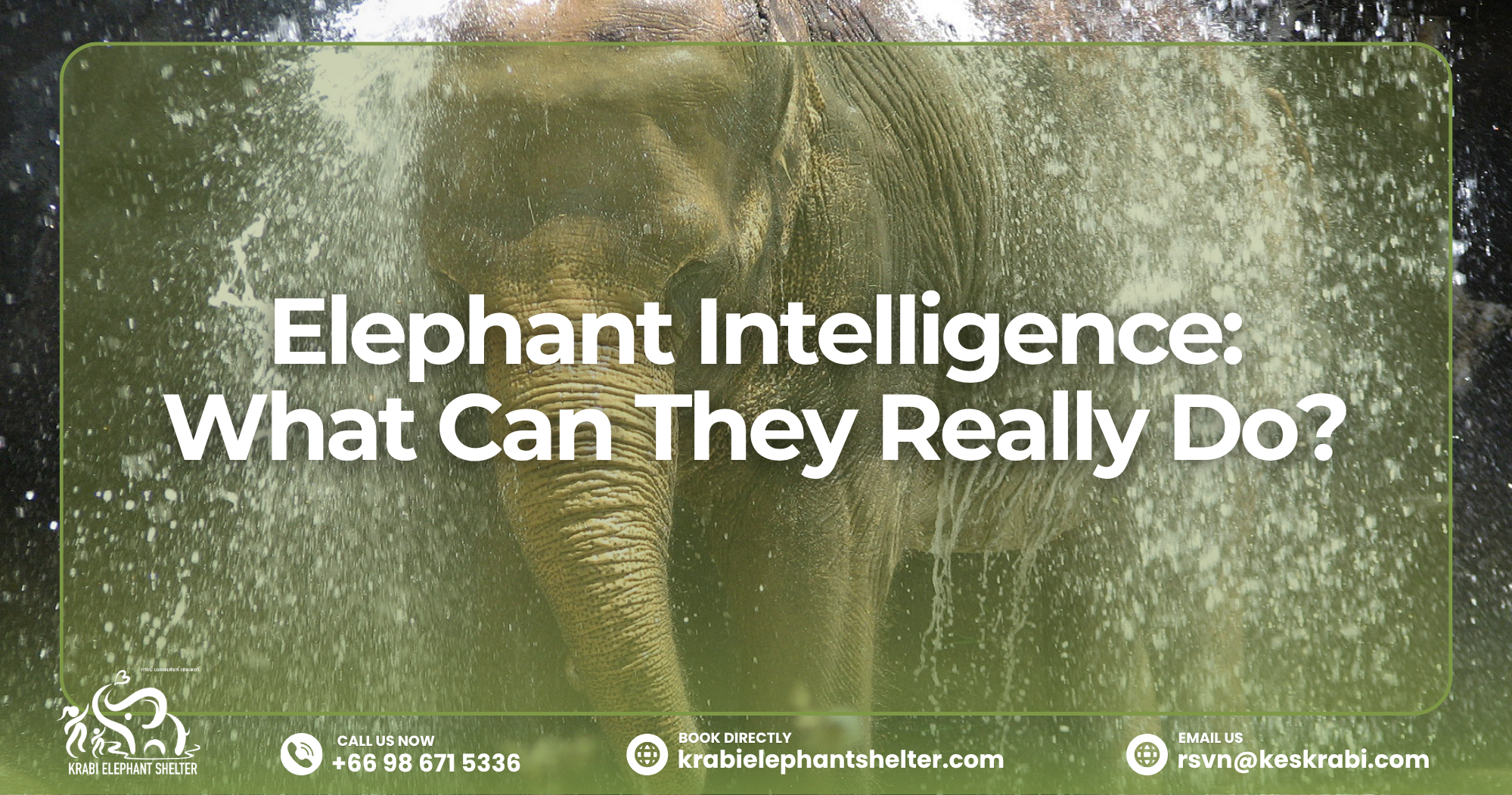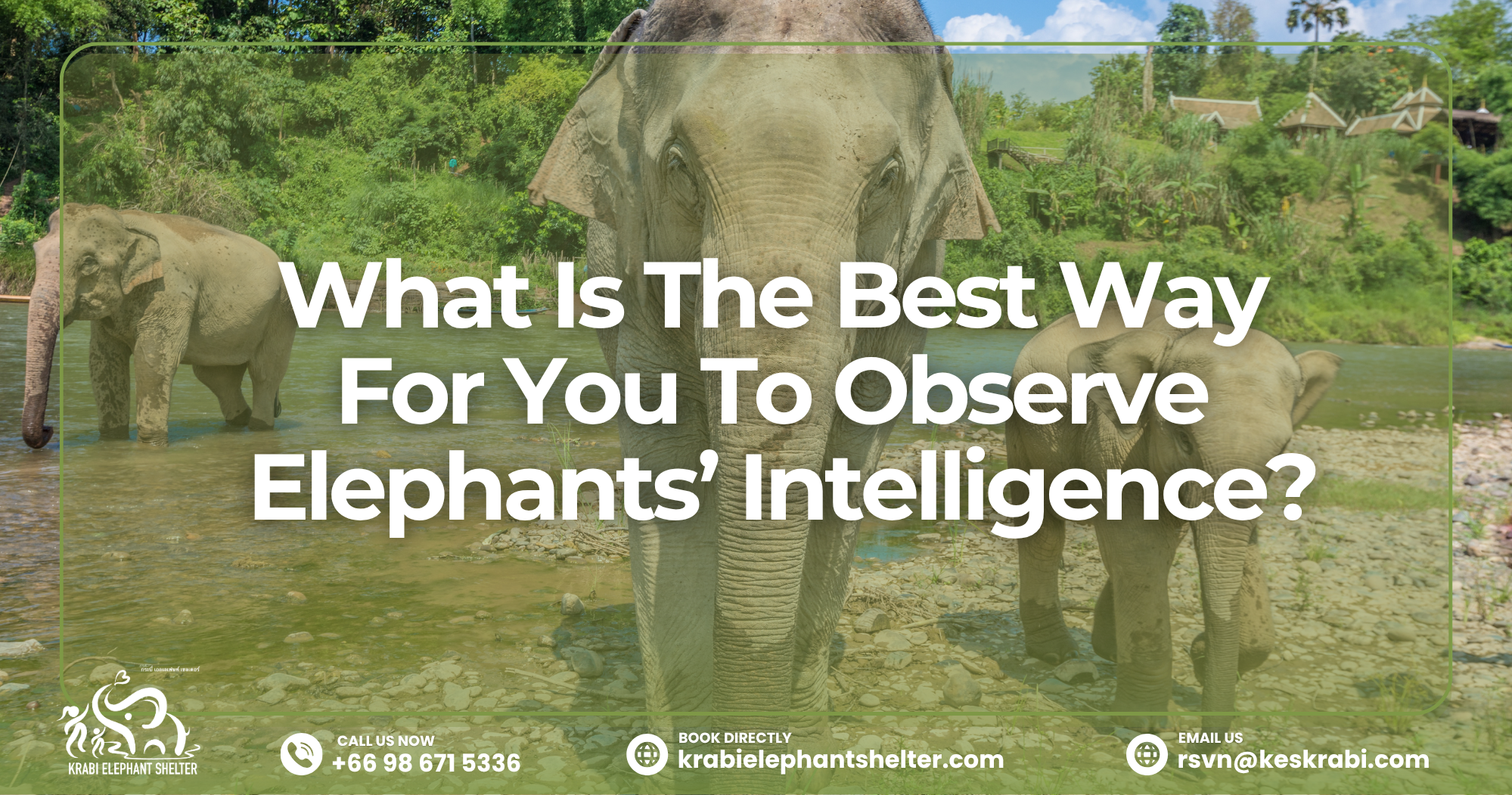Elephants have long been cited as some of the most intelligent animals on the planet, alongside dogs, apes, ravens, dolphins, octopuses, and a few others.
Depending on who you ask, however, they were often placed a bit below apes and dogs, with many people falsely believing that elephants’ ability to use tools or cooperate with each other isn’t quite on par with that of primates like chimpanzees.
However, new research keeps coming up, and the more we learn about these magnificent giants, the more we understand that they are even smarter than previously thought.
So, how smart are they really? Let’s go over the science behind elephant intelligence and examine the different ways in which that intelligence manifests.
The Aspects Of Elephant Intelligence – What Can They Really Do?
Most people have heard at least some of the aspects of elephant intelligence below, but are also surprised by many of the others. Put together, the five points below paint a rather clear picture of just how intelligent these giant animals really are.
1. Elephants Are Much Better At Using Tools Than Previously Suspected
For the longest time, people believed that elephants weren’t as good at using sticks and other tools as chimps. Only recently have researchers started to figure out that the reason elephants don’t like using sticks and tools with their trunks as much as chimps do isn’t because they are less intelligent. Instead, it’s because their trunk, which is essentially their nose, is their main sensory organ, more so than their eyes.
So, asking an elephant to use its trunk to hold tools is much like asking a person to use tools with their eyes closed. Instead, while elephants do occasionally use their trunks too, when they need to grapple something, we’re recently finding out that they are even more adept at using tools in different ways.
For example, as seen here, an Asian elephant in 2010 was observed using the large plastic blocks put in his enclosure to step on them and prop himself up to use treats that were strategically out of his reach. Instead of using a stick, the elephant preferred to keep his sensory organ free to smell and take the treats, but he was clever enough to find other means to increase his reach.
2. Elephants Can Work Together To Figure Out And Complete Complex Tasks
Another example of not only tool use, but also cooperation was tested for a study in 2010, Joshua Plotnik of Mahidol University in Thailand. There, researchers tested the elephants’ cooperation skills by placing a table full of treats beyond their reach, but with a rope that could be used to pull the treats closer.
The trick? Two elephants needed to pull both ends of the rope together, or they would fail, as it was looped around the table. Not only did the elephants figure it out, but they also taught each other how it worked, and they waited for each other to come and help.
One enterprising elephant even stopped bothering to pull and simply started stepping on her end of the rope, leaving all the pulling to her partner.
3. Elephants Can Identify Human Phrases, Gender, Age, Intonation, And Potentially Even Languages
Not only do elephants recognize human women from men, but they have also been observed to have much more fearful reactions to men than they do to women and children. The reason? Because men are usually the ones who hunt elephants.
Not only that, but African elephants in the Amboseli National Park in Kenya were once tested reacting to recordings of male voices from the Maasai and Kemba tribes. The reason?
Because Maasai men commonly hunt elephants, but Kemba men don’t. And, since the recordings were in two different languages, the elephants were seen reacting with fear to Maasai speech and phrases, but not to words in Kemba.
4. Elephants Are Empathetic Creatures And Even Mourn Their Dead
Most social mammals show at least some levels of empathy, which is understandable – empathy is the glue that holds social groups together. Some species are much more empathetic than others, however, and elephants are certainly near the top of this chart.
In fact, some might say that they are just as – if not more – empathetic than humans. We see this expressed very clearly when we observe elephants taking care of one another, consoling each other when they are upset or sad, and even mourning their dead in funeral-like rituals.
5. Elephants Have Extraordinary Memories
There’ a reason why “memory like an elephant’s” is a famous idiom, as these animals have truly impressive memories, especially considering their long lifespans.
Not only do they remember frequently-traveled routes, the way many other roaming animals do, but elephants are often seen remembering with ease routes and locations they haven’t been to in decades.
Not only that, but elephants also often remember people, such as former mahouts or caretakers, even if they haven’t seen them in years or decades.
Why Is Elephant Intelligence So Extraordinary?
So, why are elephants so smart? The most intuitive answer for most people may be that they have huge brains, the largest of any land mammal on Earth. How could they not be intelligent with brains like that?
Of course, brain size doesn’t really factor into that, at least not the way people think. Instead, elephant intelligence comes down to how their environment has shaped their needs and has guided their evolution, as is the case with us and with all other intelligent species.
For one, both Asian and African elephants, as well as their ancient predecessors, have evolved in challenging and complex ecosystems where being intelligent and being able to use tools or interpret the environment around you is life-saving.
Additionally, while they don’t have opposable thumbs, elephants have the benefit of possessing a very flexible trunk that can still grapple, hold, and manipulate objects, which also assists with and incentivizes tool use.
Lastly, elephants both have very long life spans, which helps with acquiring and developing know-how, and they are incredibly social animals, which allows them to better teach their offspring many of the things previous generations have already learned.
All this put together explains rather clearly how and why elephant intelligence is so extraordinary.
What Is The Best Way For You To Observe Elephants’ Intelligence?
All the magnificence of elephants’ cognitive potential is often dimmed by life in captivity or by mahouts and trainers wasting this elephant intelligence to teach them silly and meaningless tricks.
However, you can still experience meaningful and hands-on interactions with elephants in our Krabi Elephant Shelter.
In this ACES-certified (Asian Captive Elephants Standard) camp, elephants live in their natural environment instead of in cages or small enclosures.
And they can live life as they were meant to, while still being able to interact with tourists in a manner that’s both rewarding and safe for both sides.
If you want to observe these gentle giants up close and see just how truly intelligent they are, you can book a visit in advance or just join a walk-in tour when you come.
By visiting Krabi Elephant Shelter, your entrance fee directly supports the elephants’ care, including their food, medical treatment, and habitat upkeep. It’s a meaningful way to make your trip count—contributing to long-term animal protection efforts while enjoying a once-in-a-lifetime encounter with Thailand’s most beloved giants.
Book your trip to Krabi Elephant Shelter now!
Phone: (+66) 98 671 5336
Email: [email protected]
Book directly at krabielephantshelter.com`





